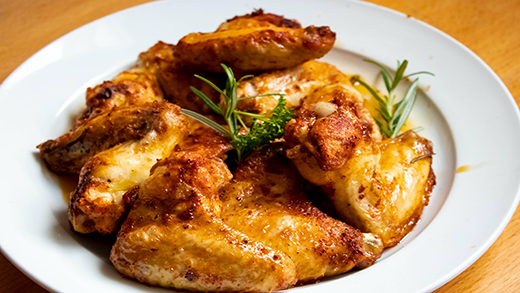
Study: Time matters when cooking chicken wings
K-State's Blakeslee shares research data on safely cooking popular finger food
Sept. 28, 2022
By Maddy Rohr, K-State Research and Extension news service
MANHATTAN, Kan. — With many flavors and varieties, chicken wings are a popular finger food in American households, but improper cooking can lead to Salmonella poisoning.
Kansas State University food scientist Karen Blakeslee said the recommended internal temperature for all poultry products is 165 degrees Fahrenheit.
Blakeslee said food scientists at the University of Nebraska-Lincoln validated the recommended temperatures for chicken wings, in particular, in a study using dry heat cooking methods.
“The goal was to validate the cooking times and temperatures to guide consumers in safely cooking chicken wings,” she said.
The study included injecting chicken wings with Salmonella and cooking the wings for various times. The convection oven was set to 288.5 F to 298.2 F and the air fryer was set to 340.7 F to 364.5 F.
“In the end, all cooking times below 22 minutes still tested positive for Salmonella,” Blakeslee said.
While this study explores two cooking methods, chicken wings can be prepared in many different ways.
“Whether using frozen or fresh chicken wings, always use a food thermometer to know the internal temperature reaches 165 F as preparation methods vary,” Blakeslee said. “Other cooking methods, such as grilling, frying, or in a conventional oven, are easy methods to cook chicken wings, but no matter what method is used, it is important to follow the cooking times to destroy any bacteria present.”
Blakeslee, who also is coordinator of K-State’s Rapid Response Center for food science, publishes a monthly newsletter called You Asked It! that provides numerous tips on being safe and healthy. More information is also available from local extension offices in Kansas.

